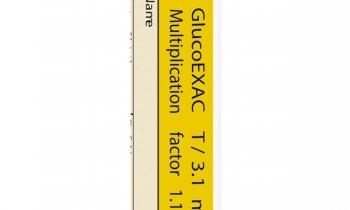Self-monitoring of blood glucose
Information/motivation/behavioural skills model highlights why some diabetics’ fail to utilise SMBG
Around 75% of adult type 1 and type 2 diabetics say they believe they know what their blood sugar levels are, without testing, according to data presented at the American Diabetes Association 70th Scientific Sessions. These results are important to consider because self-monitoring with a blood glucose meter is essential for people with diabetes to obtain accurate blood glucose results that guide adjustments to meal planning, exercise and, most importantly for insulin users, to dose their insulin accurately.

It is one of a number of key findings from a study representing the first-ever use of the well-established IMB (information--motivation--behavioural skills) model of health behaviour practice to understand barriers to self-monitoring of blood glucose (SMBG) among type 1 and type 2 diabetics.
Bayer Diabetes Care undertook the study to identify basic social and psychological factors that might be related to SMBG utilisation in individuals with type 1 or type 2 diabetes and to understand better why some patients have difficulty adhering to SMBG as recommended by their healthcare providers. Another study objective was to determine whether the IMB model, which has been applied effectively in several health behaviour domains, might be effective in helping to understand and promote adherence to SMBG. The study was conducted by a co-developer of the IMB model, Dr William Fisher, Distinguished University Professor in the Department of Psychology and the Department of Obstetrics and Gynaecology, University of Western Ontario in London, Canada.
The findings revealed substantial information gaps, motivational obstacles and behavioural skills limitations that hamper SMBG adherence. Additionally, they suggest that an IMB skills model for understanding SMBG may be conceptually and empirically worthwhile and might provide a basis for supportive educational and clinical interventions to assist individuals with diabetes to adhere to SMBG recommendations.
‘There is a considerable amount of medical literature about adherence in diabetes, and a wide range of interventions have been shown to have a positive effect on knowledge, frequency, and accuracy of SMBG,’ Dr Fisher said. ‘However, maintaining change in SMBG over time has been variable and may be dependent upon regular reinforcement. What’s been lacking is a well-integrated behavioural science model of factors that influence SMBG adherence. We are gratified to see that the IMB for understanding and promoting health behaviour change, that has worked well in a number of areas, including the prediction and promotion of safer sexual behaviour, medication adherence, and other areas, has also provided evidence of utility in understanding SMBG in diabetes.’
According to the IMB model, information about SMBG that is directly translatable into SMBG adherence and appropriate glycaemic control action based on blood glucose results, motivation to act on this information, and behavioural skills for acting effectively, are the fundamental determinants of SMBG adherence. Well-informed and well-motivated individuals will apply their behavioural skills to affect adherence to SMBG over the long run. Health outcomes of SMBG form a feedback loop that can strengthen or weaken SMBG skills, and moderating factors in an individual’s environment – e.g. competing demands from family and work - may also influence a person’s ability to engage in SMBG.
Dr Fisher presented the study in a poster, ‘Understanding Self-Monitoring of Blood Glucose: An Information-Motivation-Behavioural Skills Analysis’ at the 70th Scientific Sessions of the American Diabetes Association ADA in Orlando, this June . The poster was also highlighted during the ADA’s first ever guided audio poster tour - a new and innovative session added this year.
Additional Findings
A substantial number of patients in the analysis reported information deficits with respect to SMBG. In a research sample of 416 adult type 1 or type 2 diabetics, 46% and 53%, respectively, did not know that they should test after meals, and 21% and 40% did not know how to look for patterns in blood glucose readings and, as noted above, 75% believe they don’t need to test because they can ‘tell’ without testing what their blood glucose levels are.
Motivational obstacles to testing reported by adults with type 1 and type 2 included: reports that testing constantly reminds them that they have diabetes (45-53% respectively), is painful (34-35%), frustrating (26-25%), and time consuming (25%, 25%).
Behavioural skills limitations reported include difficulty testing without others knowing they are testing (29%, 20% type 1, type 2 respectively), difficulty downloading information from their blood sugar meter (27%, 24%), difficulty testing without too much pain (21%, 22%), and difficulty remembering to test (17%, 27%).
Importantly, findings from this research show a significant relationship between the presence of SMBG information gaps, SMBG motivational obstacles, and SMBG behavioural skills limitations with reported frequency of SMBG for individuals with type 1 and type 2 diabetes.
Speaking about the study results, Dr David Simmons, Chief Medical Officer for Bayer Diabetes Care said, ‘The depth of understanding of information gaps, motivational obstacles and behavioural skills limitations has helped us identify areas of patient education, professional education and development to improve products and services that Bayer can provide to customers.’
Study Design
The current research applied the information-motivation-behavioural skills model of health behaviour to identify correlates of frequency and adherence to recommended frequency of self-monitoring of blood glucose (SMBG) in a sample of 426 adults with type 1 and type 2 diabetes (type 1=208 and type 2=218). Participants were enrolled in the Chronic Illness Panel of Harris Interactive and completed the survey on line. Thirty-five SMBG information questions were rated on a 5-point like scale. Twenty-five SMBG motivation items were queried on 5-point and 7-point scales and 34 SMBG behavioural skills items were rated on a 5-point scale. This was a cross-sectional study, which is a study done at one point in time, not over the course of time, and can measure the distribution and current relationships of characteristics of interest in a defined population.
Respondents who indicated strong disagreement, disagreement, or neutral responses to correct information, or strong agreement, agreement, or neutral responses to incorrect SMBG information were considered ‘uninformed’. Motivational items evaluating attitudes to personal performance of SMBG were assessed on a 5-point or 7-point scale and respondents on the negative side of the scale were coded as unmotivated. On the SMBG behavioural skills scales, those who responded on the very difficult or difficult side of the scale were coded as unskilled.
Correlational analyses were conducted to assess the relationship between SMBG information, motivation and behavioural skills with average testing frequency. In both type 1 and type 2 diabetes, all three correlated with testing frequency, with stronger correlations seen in the type 1 population.
Significant greater limitations, with respect to SMBG information and SMBG motivation (P<0.05), were reported among individuals with type 2 compared to type 1 diabetes. Item selection procedures that resulted in formation of internally consistent scales assessing the SMBG information, motivation, and behavioural skills were reported (alphas >0.80), and the pattern of significant relationships among SMBG information, motivation, behavioural skills, and frequency of SMBG) in the samples of individuals with type 1 and type 2 diabetes were reported as well.
For the full article please click here
07.07.2010











